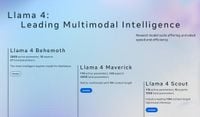Meta Platforms has made a significant leap in the field of artificial intelligence with the launch of its latest models, Llama 4 Scout and Llama 4 Maverick, on April 5, 2025. This announcement marks a pivotal moment for the company as it aims to solidify its position among industry giants like Google and OpenAI in the rapidly evolving landscape of AI technology.
Meta describes the Llama series as a multimodal AI system capable of processing and integrating various data formats, including text, images, video, and audio. This versatility is a game changer, allowing for seamless content conversion across different formats. According to Meta, the latest models are designed to enhance user experience across its platforms, including WhatsApp, Messenger, and Instagram.
In a statement, Meta CEO Mark Zuckerberg emphasized the company's ambition, stating, "Our goal is to build the world’s leading AI, open source it, and make it universally accessible... I’ve said for a while that open source AI is going to become the leading models, and with Llama 4, this is starting to happen." This commitment to open-source technology suggests a strategic approach to foster innovation and collaboration within the AI community.
The Llama 4 Scout model, equipped with 17 billion active parameters and 16 experts, boasts an impressive 10 million-token context window. This feature allows it to handle extensive documents and complex data sets efficiently. It operates on a single NVIDIA H100 GPU, making it accessible for a broader range of applications, from academic research to enterprise data analysis.
On the other hand, Llama 4 Maverick also features 17 billion active parameters but scales up with 128 experts, making it a powerhouse for general assistant tasks. Meta claims that Maverick outperforms competitors like OpenAI’s GPT-4o and Google’s Gemini 2.0 Flash in various benchmarks, including reasoning, coding, and image understanding. This positions Maverick as a versatile tool for creative writing and language comprehension.
Additionally, Meta introduced Llama 4 Behemoth in preview, which is touted as “one of the smartest LLMs in the world and our most powerful yet to serve as a teacher for our new models.” Behemoth is expected to contain a staggering 288 billion active parameters and is designed to surpass existing benchmarks set by models like GPT-4.5, Claude Sonnet 3.7, and Gemini 2.0 Pro.
The launch of these models comes amid increasing competition in the AI sector, particularly from Chinese lab DeepSeek, which has been rapidly advancing its own models. In response, Meta reportedly launched internal initiatives to enhance Llama 4's efficiency and performance, reflecting the intense pressure to innovate in this high-stakes environment.
Meta's new models leverage a machine learning technique known as mixture of experts (MoE), which allows different components of the model to specialize in specific tasks. This approach not only improves performance but also enhances the efficiency of training and inference, making it a cost-effective solution for deploying AI technologies.
However, the rollout of Llama 4 models comes with significant caveats. Notably, Meta has restricted access to these models for companies and developers based in the European Union, citing the region’s stringent AI governance and data privacy laws. This decision has sparked criticism, as Meta has previously labeled the EU’s regulatory framework as overly restrictive.
Despite these challenges, the response from the AI community has been largely positive. Developers can access Llama 4 Scout and Maverick from the Llama website and Hugging Face, as well as through Meta AI integrated into various applications. This opens up new avenues for innovation and collaboration, encouraging the developer and research communities to build intelligent, scalable, and responsible applications.
Meta's ambitious plans for 2025 include a staggering investment of between $60 billion and $65 billion aimed at expanding its AI infrastructure. This investment will focus on developing servers, data centers, and other essential resources to support the company’s growing AI ambitions.
As the competition heats up in the AI sector, the release of the Llama 4 series could redefine industry standards. With its advanced multimodal capabilities and commitment to open-source technology, Meta is positioning itself as a leader in the next wave of AI development. The future of AI is here, and with it, the promise of more intelligent and responsive systems that can engage with users in new and meaningful ways.
In summary, the launch of Llama 4 Scout, Llama 4 Maverick, and Llama 4 Behemoth represents a bold step forward for Meta Platforms in the AI arena. As these models become available for developers and users, the potential for innovation in various fields is immense, paving the way for a new era of artificial intelligence.









